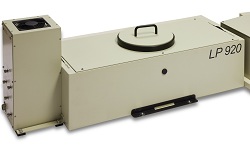RESEARCH at the University of Connecticut, USA, into plant light harvesting complexes has made use of a LP920 flash photolysis spectrometer, reports Edinburgh Instruments.

LP920 flash photolysis spectrometer from Edinburgh Instruments
A paper in the journal Photosynthesis Research examines the efficiency of variants of the Peridinin-Chlorophyll a-Protein (PCP) complex in providing photoprotection from singlet oxygen formation.
Co-authored with collaborators at Kwansei Gakuin University, Japan, this paper examines light harvesting complexes, which consist of proteins and photosynthetic pigments surrounding a photosynthetic reaction centre which collect more incoming light than would be captured by the centre alone.
PCP is found to be highly effective at protecting against photodynamic reactions, which is important because singlet oxygen can directly provoke cellular damage in plants by rapidly oxidising cellular components.
The Edinburgh Instruments LP920 was used to record transient triplet-minus-singlet absorption spectra of chlorophyll a with different peridinin molecular analogues in polar and non-polar solvents, allowing the dynamics of the reactions to be investigated.
Although the results showed that the spectral bands are shifted depending on the molecular analogue used, the dynamics of triplet state decay remain very similar for each analogue.
This means there is no marked difference between them in terms of their ability to protect against singlet oxygen formation.
The LP920 is a computer-controlled, fully automated flash photolysis spectrometer, equipped with a large sample chamber to house a variety of sample holders.
Excitation pulses at 660-670nm for these experiments were provided using an Nd:YAG pumped laser light source.
A pulsed, high-intensity 450W Xenon lamp was used for the transient absorption spectral measurements.
ref: Photosynth. Res (2010) 103; 167-174
